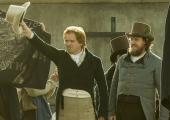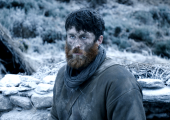DVD/Blu-ray: Alpha

Thrills, spills and sentiment in prehistoric boy-meets-wolf epic
Keda’s already in trouble for not living up to his father’s expectations. And then there’s an unfortunate clash with an angry bison which sends him careering down a steep cliff face and left for dead. Welcome to Upper Paleolithic Europe. Albert Hughes’s Alpha doesn’t contain many narrative surprises; its plot involving a lost boy struggling against the odds to get back home is straightforward in the extreme.









